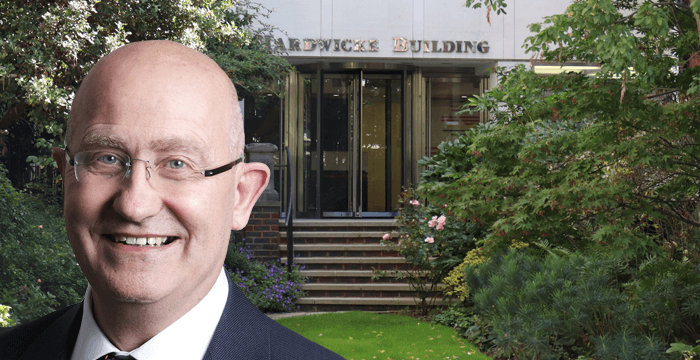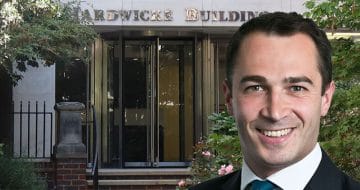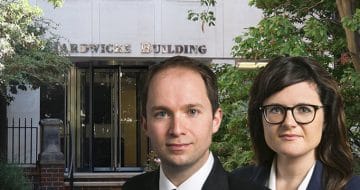PJ Kirby QC, joint head of Hardwicke, speaks to Legal Cheek ahead of his appearance this afternoon at The Future of Legal Education and Training Conference 2019

When PJ Kirby QC was called to the bar 30 years ago, attitudes towards lawyer wellbeing were unsympathetic to say the least. “Mental health and wellbeing were dealt with only when they manifested themselves in some sort of obvious crisis,” recalls PJ. If you weren’t suffering from an “extreme” problem, such as an alcohol or gambling addiction that clearly affected your work, then you were expected to “pull yourself together and get on with it.”
This mentality, although harsh by today’s standards, reflected that of the general public, which in the 1980s saw mental health stigmatised and “swept under the proverbial carpet”, explains PJ. Today, the picture couldn’t be more different. Eager to tackle this history of prejudice and social exclusion head on, the last decade has seen attempts, especially within legal practice, to oust this viewpoint from the workplace.
Integral to this shift in attitude has been recognising the different pressures facing lawyers. Before the bar, PJ practised as a solicitor for nearly a decade, where he would “spend the whole nine to five working day fire-fighting phone calls from clients”. As a former partner at Goodman Brown & Warren, a small high street type firm in London, Holborn, PJ recalls being under pressure to juggle a large number of cases, while simultaneously dealing with a wide variety of lay clients with a limited understanding of the law.
Whereas a barrister’s day-to-day will often differ. “One of the things I enjoy about the bar is that you’re dealing with far fewer cases at one time,” PJ reveals. That being said, a barrister’s hours are often unpredictable and can drag onto the weekend — punishing particularly for those with family commitments. PJ himself admits that he always takes work home and from 5pm on a Sunday, he’s part of the “Sunday night homework club”. Still, he stresses that for most barristers that’s not a constant: “You’re not always going to be working under the same pressure for everyday of the year.” Also, chances are that barristers will be working in a team with law firms and instructing solicitors — removing the pressure of dealing with lay clients, he adds.
An increasing number of barristers are, however, coming under financial pressures. As self-employed tenants within their chambers, a barrister’s income depends on the number of cases taken on, which can fluctuate depending on the practice area. For example, despite an increasing demand for their services, cuts to legal aid see criminal barristers “paid a pittance” for what was previously a reasonably well-paid area of practice, PJ explains. By contrast, a barrister working in the commercial field can earn a high income, but they too must handle the pressure of meeting overheads, including chambers’ rent, travel, insurance and pension.
This financial strain is not unique to junior barristers either. When a barrister is appointed as Queen’s Counsel (QC), they will often have to build up their practice again with their new higher fee rate, which PJ describes as “a new level of stress and a potential crisis”. He tells us: “The thinking is that the moment you become QC, the income goes up — but it often actually goes down.”
Adding to this financial uncertainty is the strain barristers put upon themselves. It is a barrister’s job to be highly critical — to constantly look for faults in their opponent’s case, PJ explains. For many barristers, however, they end up turning that analytical scope onto themselves, which can leave them constantly striving for perfection — something which PJ will touch upon at next week’s Future of Legal Education and Training Conference 2019. “They can become particularly concerned that anything that goes before the court must be perfect, which adds to the existing pressure,” he says.
The combination of these factors, among others, can have damaging repercussions on a barrister’s mental health and wellbeing. Alleviating this pressure is now part and parcel of PJ’s role as joint head of chambers at Hardwicke. For PJ, a commercial law specialist, this requires much more than promoting ‘resilience’ — an idea he believes is now outdated as a result of it being rooted in the mentality that lawyers should just “toughen up”. Rather, his main focus is to ensure better work-life balance and a supportive environment for his colleagues.
One way PJ aims to achieve this is by ensuring chambers is managed in accordance with the maxim: “Life is more than work, work is more than money, but bills have got to be paid.” At the core of this “cheesy motto”, PJ says, is that while barristers have a responsibility to meet their overheads, they should strive to achieve a healthy work-life balance.
A way of doing so could be to find a social circle outside of the legal profession. “Personally, I think it’s unhealthy to be working every day in chambers and mixing all the time with barristers and solicitors outside of work,” PJ explains. For him, this means spending time with the local church. “It gives me a connection to the local community and allows me to mix with the people who don’t know the difference between solicitor and barrister and, frankly, are not interested.”
While barristers may not face the “tyranny of emails” experienced by solicitors, technology can make it particularly difficult to keep work and home life separate, PJ explains. There’s a tendency, particularly among junior barristers, to think that any emails received over the weekend must be dealt with immediately. Instead, barristers should ask themselves: ‘Do I need to deal with it right now? Will it make a difference if I leave it to Monday morning?’
Similarly, where junior barristers, who tend to have less control over their work schedules, feel pressured to take on more that they can handle, they must learn to accept that saying ‘no’ is sometimes the right answer, PJ stresses. Likewise, clerks, practice managers and senior barristers should not always expect a ‘yes’ when handing work down.
The key to creating this honest workplace culture is Hardwicke’s ‘open door’ policy, which PJ admits to being surprised by when joining the set, having expected a closed-door culture where “barristers operate in their own ivory tower”. Having an open door, PJ explains, encourages a collegiate atmosphere in which senior and junior members of chambers feel comfortable talking openly with each other about mental health and wellbeing. Where barristers don’t feel comfortable disclosing private matters, they can make use of Hardwicke’s external wellbeing service, which offers 24/7 confidential advice and counselling on anything from financial, relationship and health matters, PJ says.
It’s because of this support network that PJ feels comfortable comparing Hardwicke to a family:
“We are in a sense a family at Hardwicke, and like all families, it doesn’t mean you always get on, but you should all share a common aim and concern for each other — and this is something I seek to engender as head of chambers.”
PJ Kirby QC will be speaking during the future of bar training debate, ‘Education and training at the bar’, at the Future of Legal Education and Training Conference 2019 later today at Kings Place, London.
About Legal Cheek Careers posts.



